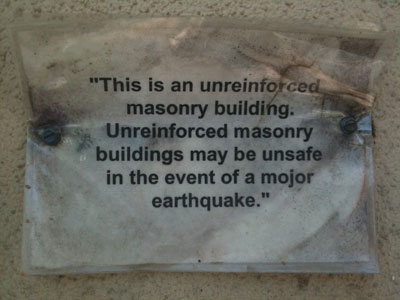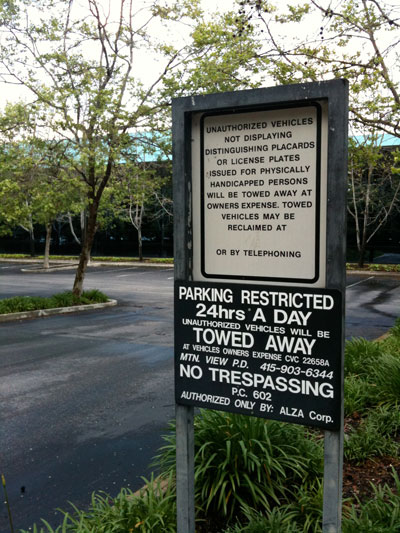Walking down Murphy Street in Downtown Sunnyvale, I spotted this warning affixed to the wall of a building:
I’ve walked past many buildings both old and new, but I’ve never seen such a warning sign before. Further down the block, I spotted the same warning again.
Interesting. The warning notice cites Assembly Bill 2533. Possibly not a law, but a bill. And, the other important item that was omitted was the all important session during which the bill was introduced because the California Assembly has this practice of reusing Assembly BIll numbers. So, from the most recent AB 2533.
AB 2533. Introduced February 19, 2010 regarding “health care coverage: quality rating.” Nope.
AB 2533. Introduced February 21, 2008 regarding “disability access: remedies.” Nope.
AB 2533. Introduced February 23, 2006 regarding “sales and use taxes: exemption.” Nope.
AB 2533. Introduced February 20, 2004 regarding “seismic safety.” Bingo!
THE PEOPLE OF THE STATE OF CALIFORNIA DO ENACT AS FOLLOWS:
SECTION 1. The Legislature finds and declares all of the
following:
(a) Jennifer Lynn Myrick, known to her friends as Jenna, was
killed by falling debris while fleeing a building in Paso Robles,
California, during the San Simeon earthquake of December 22, 2003.
(b) The building, known as the Acorn Building or Mastagni
Building, in which Jenna worked was an 1890s era unreinforced masonry
building.
(c) Section 8875.2 of the Government Code requires local building
departments to identify all potentially hazardous buildings within
their respective jurisdictions. The Acorn Building was identified as
a potentially hazardous building, but had not been retrofitted to
meet widely recognized building codes for earthquake safety.
(d) The California Seismic Safety Commission reports that, as of
2003, 1,413,398 people live in jurisdictions that had not completed
their inventory of potentially hazardous buildings, and 705,782
people live in jurisdictions with no program to retrofit unreinforced
masonry buildings.
(e) It is the intent of the Legislature to improve the public’s
awareness of potentially hazardous buildings so that occupants and
passers-by are better equipped to protect themselves in the event of
an earthquake.
SEC. 2. Section 8875.8 of the Government Code is amended to read:
8875.8. (a) An owner who has received actual or constructive
notice that a building located in seismic zone 4 is constructed of
unreinforced masonry shall post in a conspicuous place at the
entrance of the building, on a sign not less than 5 X 7 the following
statement, printed in not less than 30-point bold type:
“This is an unreinforced masonry building. Unreinforced masonry
buildings may be unsafe in the event of a major earthquake.”
(b) Notwithstanding subdivision (a), unless the owner of a
building subject to subdivision (a) is in compliance with that
subdivision on and after December 31, 2004, an owner who has received
actual or constructive notice that a building located in seismic
zone 4 is constructed of unreinforced masonry and has not been
retrofitted in accordance with an adopted hazardous building
ordinance or mitigation program shall post in a conspicuous place at
the entrance of the building, on a sign not less than 8 X 10 the
following statement, with the first two words printed in 50-point
bold type and the remaining words in at least 30-point type:
“Earthquake Warning. This is an unreinforced masonry building.
You may not be safe inside or near unreinforced masonry buildings
during an earthquake.”
(c) Notice of the obligation to post a sign, as required by
subdivisions (a) and (b), shall be included in the Commercial
Property Owner’s Guide to Earthquake Safety.
(d) Every rental or lease agreement entered into after January 1,
2005, involving a building subject to the requirements of subdivision
(b) shall contain the following statement: This building, which you
are renting or leasing, is an unreinforced masonry building.
Unreinforced masonry buildings have proven to be unsafe in the event
of an earthquake. Owners of unreinforced masonry buildings are
required to post in a conspicuous place at the entrance of the
building, the following statement:
“Earthquake Warning. This is an unreinforced masonry building.
You may not be safe inside or near an unreinforced masonry building
during an earthquake.”
(e) An owner who is subject to subdivision (b) and who does not
comply with subdivision (a) may be subject to an administrative fine
of two hundred fifty dollars ($250) to be levied by the local
building department no sooner than 15 days after the local building
department notifies the owner that the owner is subject to the
administrative fine. If the owner does not comply with the
requirements of that subdivision within 30 days of the first
administrative fine, the owner may be subject to an additional
administrative fine of one thousand dollars ($1,000).
(f) If an owner who is subject to subdivision (b) does not comply
with subdivision (b), any person may bring a civil action for
injunctive relief if all of the following have been met:
(1) He or she has made a request to an appropriate authority for
administrative enforcement of this section at least 90 days prior to
the action.
(2) An administrative fine has not been levied since the request
was made pursuant to paragraph (1).
(3) At least 15 days prior to the filing of the action, the person
has served on each proposed defendant a notice containing the
following statement:
“You are receiving this notice because you are alleged to be in
violation of Section 8875.8 of the Government Code, which requires
that the owner of an unreinforced masonry building post a sign, not
less than 8 X 10, in a conspicuous place at the entrance of the
building with the following statement, with the first two words
printed in 50-point boldface type and the remaining words in at least
30-point type:
“Earthquake Warning. This is an unreinforced masonry building.
You may not be safe inside or near unreinforced masonry buildings
during an earthquake.
Failure to post the sign in compliance with subdivision (b) of
Section 8875.8 within 15 days of receipt of this notice entitles the
sender of the notice to file an action against you in a court of law
for injunctive relief.’ “
(4) The owner has failed to post the sign in accordance with the
requirements of subdivision (b) within 15 days of receipt of the
notice served pursuant to this subdivision.
(g) The prohibitions and sanctions imposed pursuant to this
section are in addition to any other prohibitions and sanctions
imposed by law. A civil action for injunctive relief pursuant to
this section shall be independent of any other rights and remedies.
SEC. 3. This act shall be known and may be cited as the “Jennifer
Lynn Myrick Memorial Law.”


